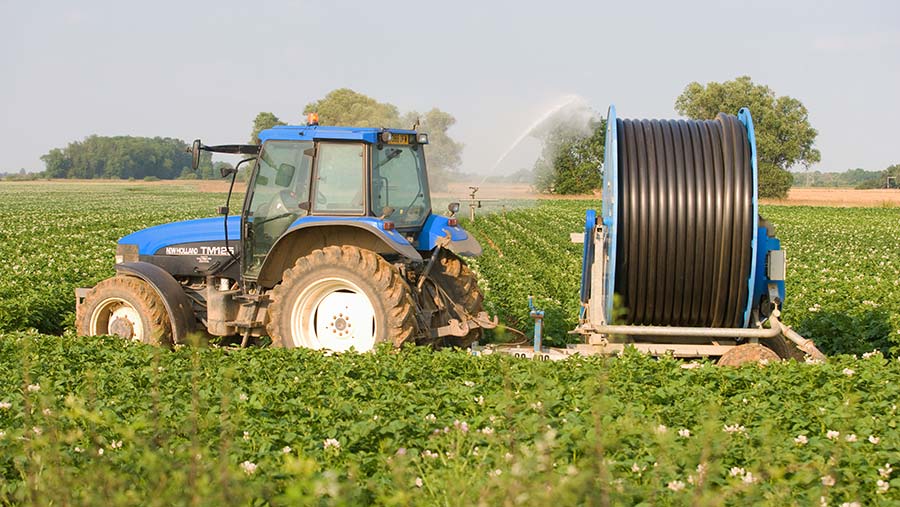EA tweaks abstraction rules and updates irrigation prospects
 © Tim Scrivener
© Tim Scrivener Abstraction licence holders who are experiencing cashflow problems because of coronavirus are being offered the opportunity to set up a payment plan with the Environment Agency (EA).
Farmers with water abstraction licences typically expect to receive their annual bill, or the first-part charge if they have a two-part tariff billing agreement, in April.
However, the agency is writing to customers offering changes to payment terms if they are experiencing problems paying their bills on time because of the lockdown.
See also: How irrigation is changing on an AHDB potato demo farm
Other amendments to normal rules include a delay on the winter or all-year abstraction returns, which are usually requested at the end of March.
Growers still need to make sure they are complying with the terms of their abstraction licences, but will not be asked to supply details of their abstractions during the period 1 April 2019 to 31 March 2020 until later in the year.
The EA will write to them to formally notify them of the new arrangements, although growers who already are registered to submit details of their abstractions online can continue to do so.
Paul Hammett, NFU water specialist, said farmers who were able to submit their returns online were likely to carry on as normal and use the digital service to get the job done while it was fresh in their minds.
“But I think the important thing is that for those who are struggling, it is an important signal from the Environment Agency that it is trying to be helpful where it can.”
Irrigation prospects
Meanwhile, the EA has revised its irrigation prospects forecasts to take account of the lack of rainfall in April throughout England.
Prospects in many areas remain “good”, but in the North West and North East of England they are now ”moderate”.
Yorkshire, East Anglia and the South East are classified as “moderate to good”.
Good status means that water levels are average or above average and supplies are expected to be safe.
Moderate prospects mean that water levels are low and so some controls on surface water abstraction are possible by midsummer if the weather is hot and dry. Controls on abstraction from groundwater are also possible in small, sensitive groundwater areas.
Mr Hammett said the irrigation season had started early for some after a dry April.
According to Met Office data, this April was the sunniest on record for the UK.
Rain in the last week of the month increased the rainfall totals in many places, but overall the UK still received only 40% of average April rainfall.
It was the third driest April on record for Scotland.
“Fortunately, as a result of widespread heavy winter rainfall which was a problem for many farms, reservoirs are full and there is generally good water availability from both groundwater and surface water sources,” Mr Hammett said.
“Farmers are closely following predictions of possible hot, dry spells in the weeks ahead and what they could mean for water availability as the irrigation season builds.”
Advice on annual returns
Completing an annual abstraction returns is about more than just filling in a form, according to water resource specialist Envireau Water.
The company, which has experience of working with businesses across the agricultural and horticultural sectors, says the process should also involve forward planning.
It offers the following advice:
- Quality-check all returns data to ensure consistency with licence conditions.
- Know the history of your abstraction and think strategically about your future requirements.
- If you have over-abstracted, then you will need to prepare a clear justification of why and create a plan for bringing abstraction back within your licensed limits. In some cases, it may be necessary to apply for additional volumes.
- If there has been under-abstraction for many years, then the “use it or lose it” approach may be an issue, so anyone with a time-related licence needs to be prepared to justify retaining existing volumes at licence renewal.
